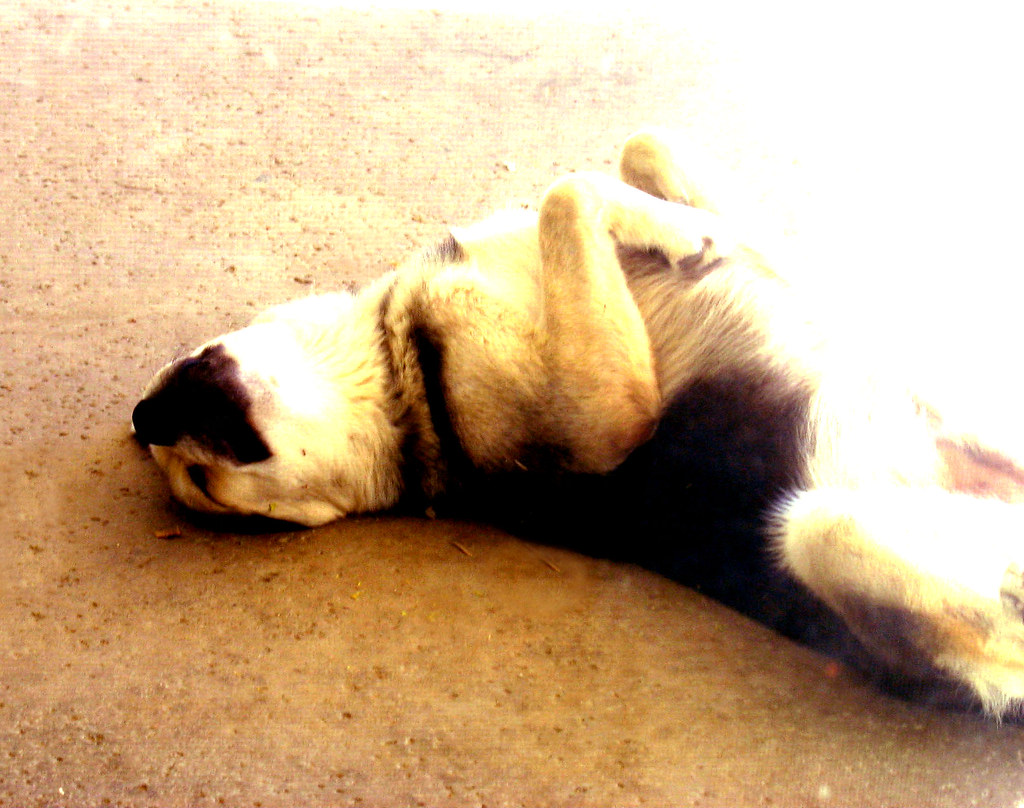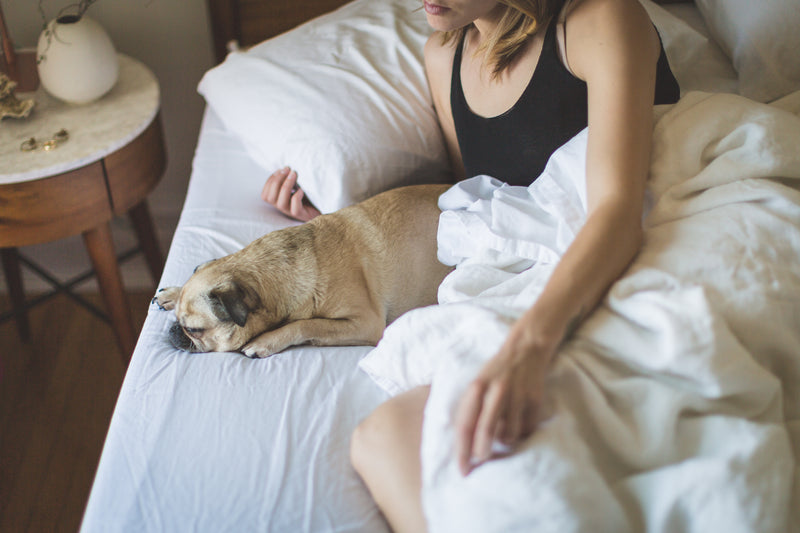As a pet owner, you know how important it is for your furry friend to get a good night’s sleep. But what happens when your dog is having trouble sleeping? It can be difficult to watch them toss and turn, and it’s natural to want to find a solution. Fortunately, there are plenty of tips and tricks that can help improve your dog’s sleep quality. In this blog post, we’ll share 10 powerful tips that you can use to help your pup get the restful sleep they need. From diet changes to bedtime routines, these tips will have your dog snoozing soundly in no time. So, if you’re ready to learn how to improve your dog’s sleep habits, read on!
Understanding the Causes of Dog Sleeping Problems
Dog having trouble sleeping can be a common issue among pet owners. There are several underlying reasons that may cause your furry friend to have difficulty falling or staying asleep at night. A common reason is discomfort and pain caused by an injury or underlying health condition such as arthritis, anxiety, or separation anxiety. Additionally, loud noises and disruptions from neighboring pets can also disrupt their sleep cycle.
It’s important to identify the root cause of dog sleeping problems, so you can take appropriate measures to address them. By establishing healthy habits and creating a comfortable sleeping environment for your dog, you can help them get the restful sleep they need to stay healthy and happy. It’s always best to consult with your veterinarian if you’re concerned about your dog’s sleeping patterns since it could be a symptom of a more significant issue that needs professional attention.
Creating a Comfortable Sleeping Environment for Your Dog
Comfortable Sleeping Environment is crucial for your dog to have a good night’s sleep. Start by choosing the right bed size and type that suits your dog’s needs. A bed that is too small or uncomfortable can cause your dog to have trouble sleeping. Make sure the bed is placed in a quiet and peaceful area of your home, away from any distractions or noise. Temperature is also an important factor to consider. Dogs prefer cooler temperatures, so make sure the room is well-ventilated and not too warm. Provide soft blankets or pillows for extra comfort, but make sure they are not too bulky or hot. Additionally, consider using aromatherapy to help your dog relax and sleep better. Lavender oil is known for its calming effects on dogs and can be added to a diffuser or sprayed on bedding.
The Importance of Exercise in Helping Your Dog Sleep Better
Regular exercise is essential for your dog’s overall health and well-being, including their sleep quality. Daily exercise can help reduce stress and anxiety levels, which can contribute to sleeping problems in dogs. It also helps tire them out physically, making it easier for them to fall asleep at night.
The type and amount of exercise your dog needs will depend on their breed, age, and health condition. Generally, dogs need at least 30 minutes to 1 hour of physical activity every day. This can include walking, running, playing fetch, or swimming.
It’s important to note that exercising your dog too close to bedtime may have the opposite effect and keep them awake. Try to schedule exercise sessions earlier in the day so that your dog has enough time to wind down before bedtime.
If you have a senior dog or a dog with mobility issues, low-impact exercises such as gentle walks or swimming may be more suitable. Consult with your veterinarian for advice on the best exercise routine for your furry friend.
How to Establish a Consistent Bedtime Routine for Your Dog
Consistent Bedtime Routine
Establishing a bedtime routine can help your dog get into the habit of sleeping at night. Try to keep his bedtime consistent every day, even on weekends. Provide plenty of exercise and playtime during the day, so that your furry friend is tired when it’s time for bed. In addition, consider giving him a relaxing massage or brushing before bed to help calm him down.
Create a comfortable sleeping environment by providing a cozy bed and blankets in an area that is quiet, dark and free from distractions such as TV or radio. If possible, try not to feed your dog just before bedtime, as this can lead to digestive issues that could disturb his sleep.
Remember to reward good behavior with treats or praise when your pup follows the nighttime routine without any fuss. With patience and consistency, you can train your dog to sleep peacefully through the night – allowing both you and your furry companion to wake up refreshed and energized!
Natural Remedies to Help Your Dog Sleep Soundly Through the Night
Natural remedies can be a great way to help your dog sleep soundly through the night. CBD oil has become increasingly popular for its calming effects on dogs, and can be added to their food or given as a treat before bedtime. Another option is valerian root, which can be found in supplement form at most pet stores. This herb has natural sedative properties and can help relax your dog’s nervous system.
You can also try using aromatherapy to create a calming environment for your dog. Lavender oil is known for its soothing properties and can be added to a diffuser or sprayed onto your dog’s bedding. Chamomile tea can also be brewed and added to their water bowl for a relaxing effect.
It’s important to note that while natural remedies can be helpful, it’s always best to consult with your veterinarian before trying any new supplements or treatments for your dog’s sleeping problems.
When to Seek Professional Help for Your Dog’s Sleeping Problems
If your dog is still having trouble sleeping despite your best efforts, it may be time to seek professional help. Consulting with a veterinarian can help rule out any underlying medical conditions that may be causing your dog’s sleep disturbances. Your vet may also be able to recommend behavioral specialists who can work with you and your dog to address any anxiety or other behavioral issues that may be contributing to their sleep problems. It’s important to address your dog’s sleeping problems as soon as possible, as lack of sleep can lead to a host of health issues and can negatively impact their overall quality of life. With the right support and treatment, you can help your furry friend get the restful sleep they need to stay happy and healthy.
In conclusion, there are a variety of tips and tricks you can employ to help your dog sleep better. By understanding the causes of sleeping problems, creating a comfortable environment, exercising regularly, establishing a bedtime routine and using natural remedies when needed, you’ll be well on your way to ensuring that your furry friend is getting quality rest every night. However, it’s important to remember that sometimes professional help may be necessary if your dog is experiencing severe or ongoing sleep disturbances. If you’re in need of any pet supplies or products that can aid in helping your pooch get some much-needed shut-eye, we encourage you to visit our shop today. Rest assured knowing that with our top-quality products and attentive customer service team behind you every step of the way, both you and your canine companion will soon be enjoying peaceful slumber all night long!
FAQs
Question: Who should I contact if my dog is having a seizure?
Answer: Contact your veterinarian immediately if your dog is having a seizure.
Question: What should I do if my dog is having trouble breathing?
Answer: Take your dog to the vet immediately if they are having trouble breathing.
Question: How can I tell if my dog is having a stroke?
Answer: Symptoms of a stroke in dogs include loss of balance, head tilt, and difficulty walking.
Question: What should I do if my dog is having diarrhea?
Answer: Make sure your dog has access to plenty of water and consult with your vet if the diarrhea persists.
Question: How can I prevent my dog from having fleas?
Answer: Use flea prevention products and keep your dog’s environment clean to prevent fleas.
Question: What should I do if my dog is having separation anxiety?
Answer: Gradually acclimate your dog to being alone and consider consulting with a professional trainer.




